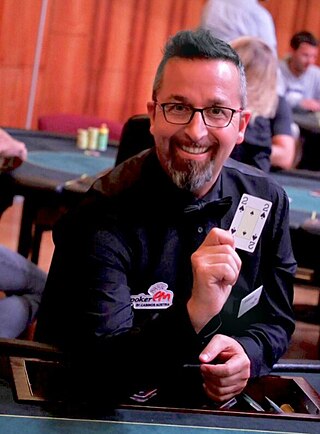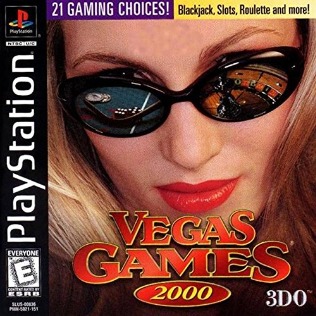Related Research Articles

Blackjack is a casino banking game. It is the most widely played casino banking game in the world. It uses decks of 52 cards and descends from a global family of casino banking games known as "twenty-one". This family of card games also includes the European games vingt-et-un and pontoon, and the Russian game Ochko. The game is a comparing card game where players compete against the dealer, rather than each other.

Games available in most casinos are commonly called casino games. In a casino game, the players gamble cash or casino chips on various possible random outcomes or combinations of outcomes. Casino games are also available in online casinos, where permitted by law. Casino games can also be played outside of casinos for entertainment purposes, like in parties or in school competitions, on machines that simulate gambling.

A game of chance is in contrast with a game of skill. It is a game whose outcome is strongly influenced by some randomizing device. Common devices used include dice, spinning tops, playing cards, roulette wheels, numbered balls, or in the case of digital games random number generators. A game of chance may be played as gambling if players wager money or anything of monetary value.

A croupier or dealer is someone appointed at a gambling table to assist in the conduct of the game, especially in the distribution of bets and payouts. Croupiers are typically employed by casinos.

Card counting is a blackjack strategy used to determine whether the player or the dealer has an advantage on the next hand. Card counters try to overcome the casino house edge by keeping a running count of high and low valued cards dealt. They generally bet more when they have an advantage and less when the dealer has an advantage. They also change playing decisions based on the composition of the deck and sometimes play in teams.
Online casinos, also known as virtual casinos or Internet casinos, are online versions of traditional casinos. Online casinos enable gamblers to play and wager on casino games through the Internet. It is a prolific form of online gambling.
Edward Oakley Thorp is an American mathematics professor, author, hedge fund manager, and blackjack researcher. He pioneered the modern applications of probability theory, including the harnessing of very small correlations for reliable financial gain.
Breaking Vegas is an American television series that premiered on the History Channel in 2004. The series covers the great lengths people have gone to make money, sometimes illegally, from casinos.
John Ferguson, known by his pen name, Stanford Wong, is a gambling author best known for his book Professional Blackjack, first published in 1975. Wong's computer program "Blackjack Analyzer", initially created for personal use, was one of the first pieces of commercially available blackjack odds analyzing software. Wong has appeared on TV multiple times as a blackjack tournament contestant or as a gambling expert. He owns a publishing house, Pi Yee Press, which has published books by other gambling authors including King Yao.
King of Vegas is a gambling series that first aired on Spike TV in the United States on January 17, 2006. It was hosted by boxing commentator Max Kellerman and co-hosted by handicapper Wayne Allyn Root, who gave color commentary and his odds-on favorites for each game. The tournament director was Matt Savage, who has also directed tournaments at the World Series of Poker.

A cardroom or card room is a gaming establishment that exclusively offers card games for play by the public. The term poker room is used to describe a room in casinos that is dedicated to playing poker and in function is similar to a card room.

Golden Nugget 64 is a 1998 virtual casino game developed by Westwood Pacific and published by Electronic Arts for the Nintendo 64. It is the only gambling/casino related game released in North America for the Nintendo 64. The game starts off by having the player create an account with $1000 which is saved on the controller pack. Players have the choice from one of ten different popular casino games. Each game has its own set of rules and a guide to learn how to play.
Kevin Blackwood is a professional blackjack player, card counter and gambling author. He is best known for his novel, The Counter, and his instructional book, Play Blackjack Like the Pros.
Advantage gambling, or advantage play, refers to legal methods used to gain an advantage while gambling, in contrast to cheating. The term usually refers to house-banked casino games, but can also refer to games played against other players, such as poker. Someone who practices advantage gambling is often referred to as an advantage player, or AP. Unlike cheating, which is by definition illegal, advantage play exploits innate characteristics of a particular game to give the player an advantage relative to the house or other players. While not illegal, advantage play may result in players being banned by certain casinos.

The Monte Carlo Casino, officially named Casino de Monte-Carlo, is a gambling and entertainment complex located in Monaco. It includes a casino, the Opéra de Monte-Carlo, and the office of Les Ballets de Monte-Carlo.
Shuffle tracking is an advantage gambling technique where a player tracks certain cards or sequences of cards through a series of shuffles. Shuffle tracking is typically done in blackjack games, although it can be done in other card games. Games with simple shuffles are generally easier to shuffle track than games with complicated shuffles. Thus, shuffle tracking is usually done in 6 or 8 deck shoe-dealt blackjack games, as these tend to have simpler shuffles compared to pitch games, due to the time required to accomplish a complicated shuffle on 6 or 8 decks of cards.

Splitting aces and eights is part of blackjack basic strategy. Rules vary across gambling establishments regarding resplitting, doubling, multiple card draws, and the payout for blackjack, and there are conditional strategic responses that depend upon the number of decks used, the frequency of shuffling and dealer's cards. However, regardless of the various situations, the common strategic wisdom in the blackjack community is to "Always split aces and eights" when dealt either pair as initial cards. This is generally the first rule of any splitting strategy.
Four Horsemen of the Apocalypse is the name given by gambling authors to the four U.S. Army engineers who first discovered in the 1950s the best playing strategy in the casino game of Blackjack that can be formulated on the basis of the player's and the dealer's cards. The so-called Basic Strategy, which was subsequently refined through the use of computers and combinatorial analysis, loses the least money to the casino in the long term.

Trump Castle is a series of gambling video games published by Capstone Software between 1989 and 1993. The games are named after Trump's Castle hotel-casino in Atlantic City, New Jersey, and were released for Amiga, Atari ST, Commodore 64, Commodore 128, and MS-DOS.

Vegas Games 2000, known as Vegas Games: Midnight Madness, Midnight in Vegas in Europe and Vegas Games on Game Boy Color, is a gambling simulation video game. It was released on Microsoft Windows in 1998, then released in 2000 on PlayStation and Game Boy Color. New World Computing, who developed the original PC version, had previously developed Vegas Games and More Vegas Games for Windows in the early 1990s.
References
- 1 2 3 Patterson, Jerry (2001). Blackjack, a winner's handbook (1st ed.). New York: Berkley Pub. ISBN 978-0-399-52683-1.
- ↑ Roberts, Stanley (1984). The Gambling Times guide to blackjack. Hollywood, CA: Gambling Times]. ISBN 0-89746-015-4.
- ↑ Patterson, Jerry; Olsen, Eddie (1986). Break the dealer : winning strategies for today's blackjack. New York, NY: Putnam. p. 83. ISBN 0-399-51233-0.
- ↑ Patterson, Jerry; Sharpshooter (2000). Casino gambling : a winner's guide to blackjack, craps, roulette, baccarat, and casino poker (1st ed.). New York: Berkley Pub. Group. ISBN 0-399-52511-4.

